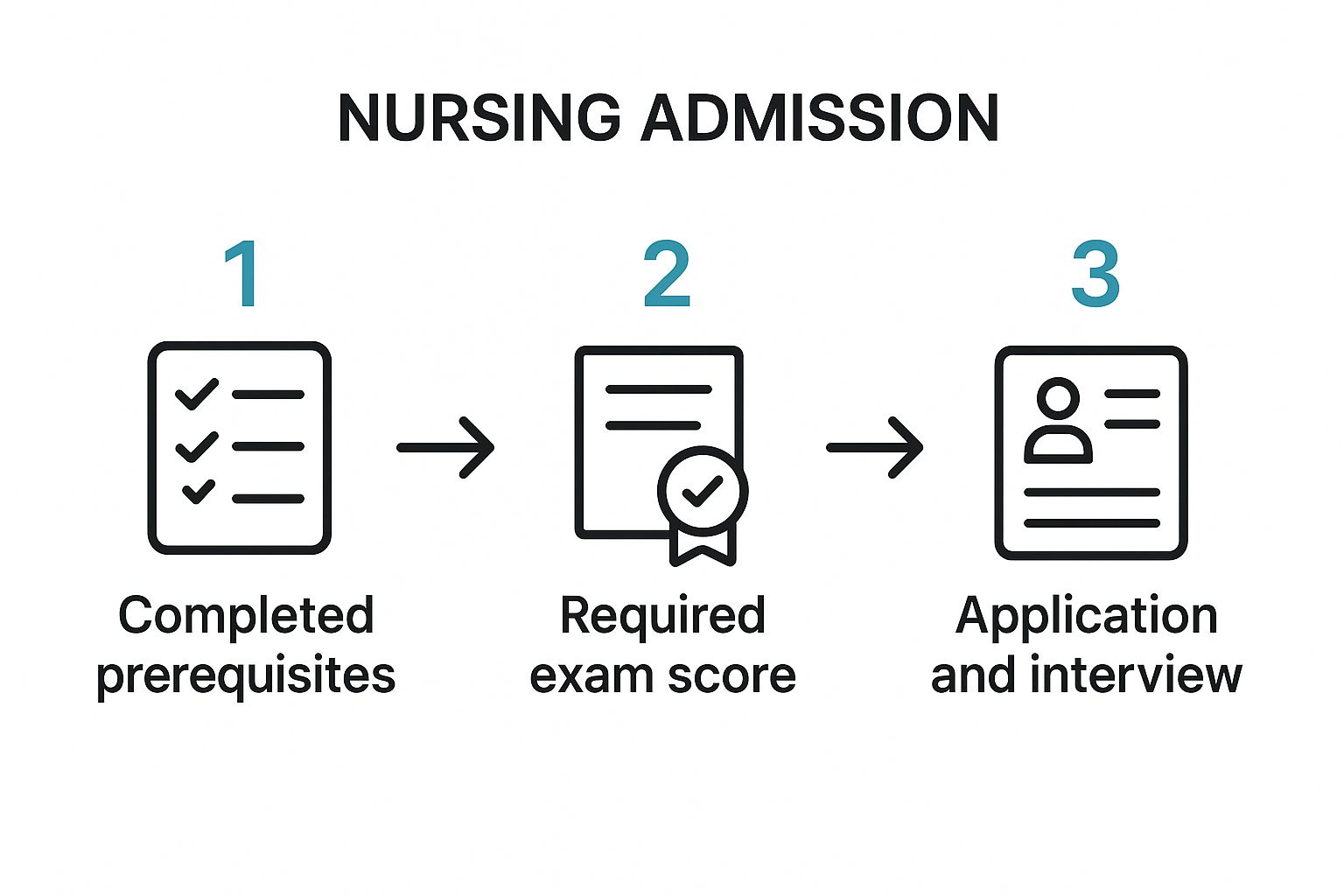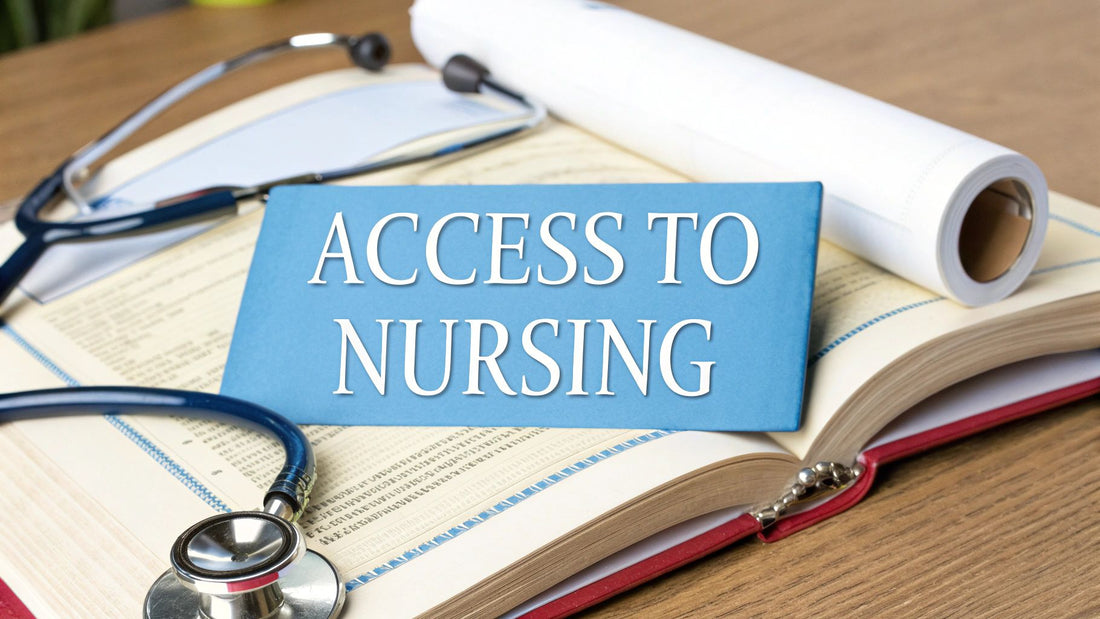Been dreaming of becoming a nurse but feel like not having A-Levels has shut the door? It hasn't. An Access to Higher Education Diploma is the key to unlocking that door—it's a qualification specifically designed for adults who are ready to chase their career goals. For anyone wanting to get into nursing without the traditional qualifications, this is the most direct and respected route there is.
Your Bridge to a Nursing Degree Without A-Levels
For so many aspiring nurses, the real roadblock isn't a lack of passion or commitment; it's just not having those specific qualifications like A-Levels. Life happens, and the straight-out-of-school academic path isn't everyone's story. This is exactly where the Access to HE Diploma comes in. It literally acts as a bridge, connecting your life experience with your future university degree.
Don't just think of it as another course. It’s more like a dedicated training ground that gets you back into the swing of formal education, but in a supportive setting full of other adult learners. It goes way beyond just teaching you subjects; it builds a rock-solid foundation of knowledge and skills that you'll need to handle the demands of a nursing degree.
Building University-Ready Skills
The diploma zeros in on two crucial areas to set you up for success. First, it gives you the essential scientific knowledge that is the absolute bedrock of healthcare. You’ll get stuck into the core subjects that every nurse needs to know inside and out.
Key academic areas often include:
- Human Biology: You have to understand how the human body works to provide effective patient care. It's non-negotiable.
- Psychology: Getting a real insight into human behaviour and mental health helps you connect with your patients on a much deeper, more effective level.
- Health Studies: This gives you the bigger picture, looking at everything from public health policies to the tough ethical questions nurses face.
- Sociology: Understanding the social factors that affect a person's health gives you a more complete and compassionate view of your patients' needs.
Secondly, the course gets you 'match-fit' for university study. It's one thing to understand a topic, but it’s another thing entirely to be able to research it properly, pull it apart critically, and write a compelling academic essay about it.
The Access to HE Diploma is structured to transform your life experience and ambition into the academic currency that universities recognise. It validates your potential and proves you have the discipline and knowledge required for degree-level study.
More Than Just an A-Level Equivalent
Yes, the diploma is a Level 3 qualification—the same academic level as A-Levels. But its real magic is in how it's built from the ground up for adult learners. The entire curriculum is designed with the understanding that you're not coming in as a blank slate; you bring a wealth of life experience with you. The course helps you channel that experience into a mature, reflective way of learning that universities absolutely love to see in nursing applicants.
This means that when you walk into your first lecture, you won't just be meeting the entry requirements. You'll be one of the most prepared, confident, and ready-to-learn students in the room.
If you’re ready to get started, you can find out more about the specific modules and structure of an Access to Higher Education Diploma for Nursing and see just how it can turn your ambition into a reality.
Who Is an Access to HE Nursing Diploma For?

Ever wondered if you've got what it takes to be a nurse, but worried you missed the boat on the right qualifications? The Access to Higher Education Diploma in Nursing might just be the key you're looking for. While it's open to anyone aged 19 or over, it’s truly built for a specific kind of person: the adult learner whose life hasn’t exactly followed a textbook path.
This isn't just a simple alternative to A-Levels. Think of it as a purpose-built pathway designed for adults coming back to education. It understands that you’re not starting from scratch; you’re bringing a wealth of life experience to the classroom. The learning environment reflects this—it’s mature, supportive, and full of people who get it, because they're juggling the same real-life challenges as you.
Does This Sound Like You?
Students who really flourish on this course often see a bit of themselves in these stories. Do any of them ring a bell?
-
The Career Changer: You're in a job that pays the bills, but it doesn't light a fire in you. You feel a pull towards a career where you can make a real, tangible difference. Nursing, with its blend of compassion and critical thinking, keeps calling your name.
-
The Parent Ready for a New Chapter: Maybe you’ve spent the last few years raising a family and now you're ready for something for you. You want a stable, rewarding career, and you already have first-hand experience with the patience and empathy that are at the heart of nursing.
-
The Person Whose Time Is Now: School might not have been your thing the first time around. Life gets in the way. But now, you’re older, wiser, and you have a crystal-clear goal. You're ready to dive in and show yourself (and everyone else) what you’re truly capable of.
If you nodded along to any of these, you’re in the right place. These are the kinds of determined, passionate people who use this diploma to kickstart their access to nursing higher education and build a future they love.
The diploma is built on a simple but powerful idea: motivation and life experience are just as valuable as exam results. It's structured to help you turn those real-world strengths into academic success.
A Course Designed for Real Life
Let’s be honest—one of the biggest hurdles for adult learners is fitting study around everything else. Work, kids, bills... it's a lot. The Access to HE Diploma was created with exactly this in mind. It's challenging, of course, but it’s also flexible and supportive, giving you a realistic shot at succeeding.
And the need for people like you has never been greater. The nursing workforce is growing, but so are the challenges. As of March 2025, there were 853,707 professionals on the Nursing and Midwifery Council register—a 3.3% rise from the previous year. However, the number of new nurses joining fell by almost 12%, while more experienced nurses left the profession. These numbers, available in the latest UK nursing workforce statistics from the NMC, paint a clear picture: healthcare needs fresh, dedicated talent.
Ultimately, this course is for anyone with the determination and passion to care for others. If you see yourself in this picture and are ready to commit to your dream, then an Access to HE Diploma is almost certainly the perfect launchpad for you. It's a direct, respected, and supportive route into the nursing career you’ve always wanted.
What You’ll Learn on Your Access to Nursing Course

Starting an Access to Nursing course is like getting the keys to your future. The curriculum is carefully put together not just to feed you facts, but to build the real-world knowledge and skills you’ll lean on every single day, both at university and on the hospital ward. It’s an immersive experience, getting you ready for the academic demands of a degree and the very human side of patient care.
The course is built around a set of core modules that give you a solid grounding in the subjects that form the backbone of modern healthcare. This isn't about memorising textbook definitions; it’s about really getting the 'why' behind everything a healthcare professional does.
Building Your Scientific Foundation
At the very heart of the diploma, you'll find the core science units. Think of these as the bedrock on which all your future nursing expertise will be built. They give you that essential, non-negotiable understanding of the human body and health needed to provide safe and effective care.
-
Human Biology: This is where you’ll dive into the amazing systems of the human body, from the cardiovascular system right down to how our cells work. Understanding this is absolutely crucial for everything from administering medication correctly to assessing a patient’s condition and spotting the first signs of illness.
-
Health Studies: This module zooms out from individual patients to the bigger picture of public health. You'll explore topics like health promotion, preventing disease, and the kind of ethical dilemmas nurses often face in their day-to-day practice.
These subjects are woven together, so the theory you're learning is always connected to its practical use. For instance, learning about the respiratory system in biology is immediately relevant when you then study conditions like asthma or COPD in health studies. It’s this integrated approach that makes sure you’re building practical, usable knowledge right from the start.
To give you a better idea, here's a look at the kind of modules you can expect to find in a typical Access to HE (Nursing) Diploma. The exact units might vary slightly between course providers, but the core focus on biology, health, and academic skills remains the same.
Typical Modules in an Access to HE (Nursing) Diploma
| Module Category | Example Units | Relevance to Nursing Degree |
|---|---|---|
| Core Sciences | Human Biology, Anatomy & Physiology, Cell Biology, Chemistry for Biology | Provides the essential scientific knowledge needed to understand human health, disease, and treatment. |
| Health Studies | The Role of the Healthcare Professional, Health Promotion, Introduction to Psychology, Social Factors in Health & Social Care | Builds understanding of the wider context of health, patient psychology, and the professional standards of nursing. |
| Academic Skills | Study Skills, Academic Writing, Research Methods, Critical Thinking, Presentation Skills | Develops the university-level skills required for writing essays, conducting research, and succeeding academically. |
As you can see, the diploma gives you a well-rounded foundation, covering not just the "what" of nursing but also the "how" and "why."
Understanding the Human Element of Care
Great nursing is about more than just the science; it’s about connecting with people when they are at their most vulnerable. That’s why your access to nursing higher education course also focuses on the social and psychological sides of health.
Modules in Psychology help you understand human behaviour, mental health conditions, and the huge emotional impact an illness can have on a person. This insight is vital for communicating with empathy and building that all-important trust with patients and their families.
In a similar way, Sociology modules explore how social factors—things like a person's income, where they live, or their cultural background—can affect their health. This encourages you to take a holistic approach, helping you see the whole person, not just a medical chart.
An Access to HE Diploma doesn't just teach you about the body; it teaches you about the person inside it. It connects biological science with compassionate understanding, preparing you for the multifaceted reality of nursing.
Mastering Essential University-Level Skills
On top of the subject-specific knowledge, the diploma puts a huge emphasis on developing the academic skills you'll need to thrive at university. A lot of adult learners worry about getting back into formal writing and research, and the course is designed to build your confidence step by step.
You will learn how to:
- Conduct Academic Research: Find, evaluate, and use credible sources for your assignments.
- Think Critically: Analyse information, form balanced arguments, and learn to question assumptions.
- Write Effectively: Structure essays properly, reference correctly, and communicate your ideas clearly.
- Manage Your Time: Juggle different assignments and deadlines—a key skill for any degree-level student.
These skills aren’t taught in a vacuum. They are woven into every single module, so you're constantly putting them into practice as you learn. By the time you finish your diploma, you'll be more than ready to meet the challenges of your nursing degree, armed with a powerful mix of scientific knowledge, human insight, and academic confidence.
How to Navigate the Application Process
Starting the journey towards a nursing degree is a thrilling time, but let’s be honest—the application process can feel like you’re trying to solve a complicated puzzle. Think of this section as your practical, step-by-step guide. We’ll walk through everything from the absolute must-haves to acing your university interview.
The very first step on your access to nursing higher education path is to make sure you tick all the non-negotiable boxes. These are the foundations of your application; without them, even the most heartfelt personal statement won't get you through the door.
Checking the Essential Entry Requirements
Before you even think about writing your personal statement, you need to confirm you have the right GCSEs. For just about every nursing degree in the UK, this means having a grade 4/C or above in both Maths and English. Universities are incredibly strict about this, and for good reason.
Why are they so vital?
- Numeracy Skills (Maths): Nurses are constantly using maths. It's not just about sums; it's about calculating drug dosages, monitoring a patient's fluid intake, and interpreting vital data. Accuracy here isn't just a goal—it's critical for patient safety.
- Literacy Skills (English): Clear communication is the absolute bedrock of nursing. You’ll be writing precise patient notes, reading complex medical documents, and, most importantly, talking with empathy and clarity to patients and their families.
These GCSEs prove you have the core skills needed to study effectively and practise safely as a nurse. If you don't have them yet, make getting them your number one priority.
Crafting a Compelling Personal Statement
Okay, this is where you get to bring your application to life. Your personal statement is your chance to tell your unique story and show the admissions tutors who you are beyond the grades on a piece of paper. It’s not just an essay—it's a narrative that should scream passion, highlight your experience, and prove you're a perfect fit for a nursing career.
To really make your statement pop, focus on these areas:
- Your "Why": Why nursing? Dig deeper than just "I want to help people." What specific life event sparked this passion? Maybe you cared for a relative, or perhaps the kindness of a nurse during a difficult time inspired you.
- Your Life and Work Experience: Don't worry if you haven't worked in a hospital. Think about the transferable skills you’ve gained from other roles. Did you work in a busy café, demonstrating patience and communication? Have you run a household, proving your organisation and resilience? It all counts.
- Your Understanding of the Role: Show them you've done your homework. Acknowledge that nursing isn't just rewarding; it's also incredibly challenging. This shows maturity and proves you've made a considered, realistic decision.
Your personal statement should connect the dots between your past experiences and your future aspirations. It’s your opportunity to prove that your unique life journey has perfectly prepared you for the demands and rewards of a nursing career.
This infographic breaks down the core stages of the journey, from getting your qualifications sorted to handling that final interview.

Each step is a building block, creating a complete picture of who you are and why you're ready for a nursing degree.
Preparing for the University Interview
Getting that interview invitation is a massive win! This is the final hurdle. The university wants to meet you, assess your communication skills, and see if your personality clicks with the fundamental values of nursing. Preparation is everything.
You should definitely expect questions that touch on the 6 Cs of nursing – Care, Compassion, Competence, Communication, Courage, and Commitment. Have real-life examples ready to go that show you embody these qualities.
You might be asked things like:
- "What do you think are the biggest challenges facing the NHS today?"
- "Describe a time you worked as part of a team to solve a problem."
- "How do you handle stressful situations?"
Practise your answers, but don't try to memorise a script. The aim is to come across as genuine, thoughtful, and truly passionate. The whole application marathon can feel a bit overwhelming, but breaking it down makes it so much more manageable. For an even more detailed walkthrough, you can learn more about how to apply to university after an Access course and pick up some extra tips.
Funding Your Studies and Managing Your Finances

Let’s be honest, one of the biggest questions on any aspiring student's mind is, "How on earth can I afford this?" It's completely normal to worry about the financial side of things, but it absolutely shouldn't be the barrier that stops you from pursuing a hugely rewarding career in nursing.
The good news is, there are some brilliant funding options out there designed specifically for adult learners on this exact path.
Think of funding your Access to HE Diploma not as a cost, but as the single best investment you can make in your future. The main way to cover your course fees is through the Advanced Learner Loan, a government-backed loan that makes financing your studies much more straightforward and accessible.
How the Advanced Learner Loan Works
The Advanced Learner Loan isn’t like a typical bank loan. It’s built to be manageable, with repayments only kicking in once you’re earning above a certain salary. This means you won’t have to stress about paying it back until you're financially stable and working in your new career.
But here’s the most powerful part for aspiring nurses:
If you take out an Advanced Learner Loan to fund your Access to HE Diploma and then go on to complete a university degree in nursing (or another eligible healthcare course), the government will completely write off your outstanding loan balance.
This is a genuine game-changer. It effectively means your Access to HE Diploma becomes free once you achieve your ultimate goal of getting your nursing degree. This brilliant policy is in place to encourage more people to enter vital professions like nursing, making your access to nursing higher education journey so much more affordable.
Beyond the Loan: Other Financial Support
While the Advanced Learner Loan is the main way to fund the diploma itself, it’s not the only financial help available. Many colleges also offer their own support systems to help learners with the other costs that come with studying.
You may be able to get help from:
- College Bursary Funds: These are pots of money that can help with costs like childcare, travel, or essential course materials. Eligibility can vary, so it's always worth having a chat directly with your chosen course provider to see what’s available.
- NHS Learning Support Fund (LSF): Once you get to university, you can apply for the LSF. This offers a non-repayable training grant of at least £5,000 per academic year, plus extra funding for students with dependent children and to cover specific travel and accommodation costs for placements.
This financial support is more crucial than ever as the healthcare sector works to attract new talent. Recent figures show a welcome, if slight, uptick in students accepting nursing degree places. In 2025, 18,640 people in England started a nursing degree, a 1% increase from the previous year. You can explore more about the latest nursing student trends on the NHS Confederation website to get a feel for the current landscape.
By combining these funding options, you can build a solid financial plan that allows you to focus on what truly matters—your studies. For a deeper dive, our guide to funding your Access to Higher Education course provides even more detail.
Your Career Path After the Diploma
Finishing your Access to HE Diploma is a massive milestone, but it's really just the beginning. Think of it as the launchpad for your entire nursing career. This diploma is your official ticket to university, turning all your hard work into the UCAS points you need to apply.
But here’s something you should know: you’re not just meeting the entry requirements. You’re often exceeding them.
Universities have a huge amount of respect for Access students. Why? Because you arrive with a brilliant mix of life experience, academic grit, and a crystal-clear commitment to becoming a nurse. You’ve already proven you can knuckle down and manage your own studies, which makes you an incredibly strong applicant.
Choosing Your Nursing Specialism
Once you've got your university place, the fun really starts. You get to choose your specialism. Nursing is an incredibly broad field, which means you can focus your career on the type of care that truly matters to you. Your degree will be built around one of these core pathways.
- Adult Nursing: This is the most common specialism, focusing on caring for adults of all ages with all sorts of physical health conditions. You could find yourself on a fast-paced surgical ward, in a local GP practice, or working in a specialist clinic.
- Child Nursing (Paediatrics): If you love the idea of working with children and young people—from tiny newborns right up to teenagers—then this is for you. It takes a special set of skills to care for young patients while supporting their worried families.
- Mental Health Nursing: This specialism is all about supporting people with mental health conditions. You’ll build powerful therapeutic relationships and guide people on their road to recovery, working in settings from community centres to secure hospital units.
- Learning Disability Nursing: In this role, you’ll be empowering people with learning disabilities to live independent, fulfilling lives. It’s a hugely rewarding field that revolves around advocacy, health promotion, and providing holistic support.
Each path leads to a completely different but equally rewarding career within the NHS and private healthcare.
A Career with Stability and High Demand
Let’s be honest, choosing nursing means stepping into a profession with incredible stability. The demand for qualified nurses is immense. Right now, the healthcare sector is facing a real challenge in finding new talent.
Recent data showed that applications to UK nursing programmes hit a record low in 2025, with just 30,550 applications submitted by the January deadline. That’s a sharp 34% drop since the surge we saw after the pandemic in 2021. The Royal College of Nursing (RCN) has raised serious concerns about these numbers, underlining just how urgently new, dedicated nurses are needed. You can read more about the latest trends in nursing applications to see why your skills will be so welcomed.
Your decision to pursue access to nursing higher education isn’t just a personal career move; it's a vital contribution to the future of UK healthcare. Passionate, qualified nurses are the absolute backbone of our health system.
This situation means that when you graduate, you’ll be in high demand. A nursing degree gives you a clear, direct route to a stable and respected profession where you can make a real difference in people's lives, every single day. Your Access to HE Diploma is the first, crucial step on that incredible journey.
Your Top Questions Answered
Stepping back into education to chase your dream of becoming a nurse can bring up a lot of questions. It's completely normal to wonder about the details! Let's clear up some of the most common queries about using an Access to Higher Education Diploma to launch your new career.
Am I Too Old for an Access to Nursing Course?
Absolutely not. One of the best things about these diplomas is that there's no upper age limit. In fact, they’re specifically designed for adult learners, usually those aged 19 and over.
You'll find yourself in a mature, supportive learning environment where your life experience isn't just accepted; it’s seen as a huge asset. It brings so much richness to classroom discussions and gives you a unique perspective on healthcare.
How Demanding Is the Course?
It’s definitely a commitment. The diploma is designed to be completed in one academic year, which makes it an intensive, fast-paced qualification. Think of it as the equivalent of full-time study. It demands a serious amount of your time to stay on top of the coursework, hit your assignment deadlines, and do your own independent research.
While some students do manage to hold down a part-time job, it can be a real juggle. To give yourself the best chance of success, most colleges and providers suggest working no more than 10-15 hours per week. This way, you can properly dedicate yourself to your studies.
The Access to HE Diploma is a nationally recognised qualification accepted by the vast majority of UK universities for entry onto their nursing degree programmes. It is your direct route to achieving your career goals.
A word of advice, though: always, always check the specific entry requirements for each university you’re interested in. Some might prefer certain modules or ask for particular grades, so doing a bit of homework beforehand will make your application process so much smoother.
What if I Don’t Have GCSEs in Maths and English?
This is one of the few non-negotiables for universities. To get onto a nursing degree, you absolutely must have GCSEs in both Maths and English at a grade 4/C or higher.
If you don't have these qualifications yet, don’t panic! You’ll just need to get them sorted before you can start your degree. Many colleges offer GCSEs or equivalent courses like Functional Skills Level 2. Often, you can take these before or, in some cases, even alongside your Access to HE Diploma. It's just a critical extra step on your journey to becoming a nurse.
Ready to take that next step and start building your future in nursing? At Access Courses Online, we provide the accredited, flexible diploma you need to get to university. Explore our Access to HE Nursing Diploma today and start your journey.

